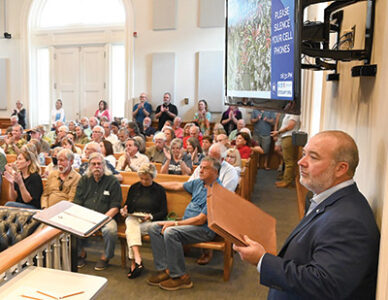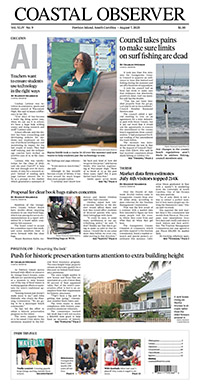Land use
Golf course owners want to negotiate for higher density

Tom Stickler and Stephen Goldfinch agreed that the wording of a new zoning district for the Founders Club and Litchfield Country Club golf courses needs more work, and were pleased that the Georgetown County Planning Commission last week urged County Council to defer action, but not for the same reason.
Stickler, president of the Hagley Estates Property Owners Association, said the wording for the district needs to better restrict residential development if the courses close.
Goldfinch, a state senator and attorney representing the owners of the courses, said the district allowance of one unit for every five acres is too restrictive.
“We’re making every effort to satisfy the homeowners,” Goldfinch said before the Planning Commission met to review the proposal last week. “So it doesn’t turn into an Indian Wells.”
That course in Horry County, like the Founders Club and Litchfield Country Club, is also owned by the Founders Group. Goldfinch said he was representing the company “in a limited capacity.” He represented the homeowners at Indian Wells when the Founders Group wanted to redevelop it in 2019. The plan was rejected and the course has sat vacant ever since.
The Founders and LCC courses are currently zoned “residential 10,000 square feet” like the neighborhoods that surround them. Residents have long been concerned that the courses, built in the 1960s, could be redeveloped. Other courses in the area are part of “planned development” zoning districts that are more restrictive.
The county has proposed a “neighborhood amenity” zoning district that would allow recreational and public uses, but restrict residential development. In addition to a density of one unit for every five acres, with a minimum lot size of one acre, any lots would need frontage on public streets that exist at the time the zoning is changed.
Goldfinch said Founders Group is only concerned about the impact of the change on the Founders Club in Hagley.
“The course isn’t making money,” he said. “I don’t think anyone’s talking about Litchfield right now.”
Founders Club also has frontage on Highway 17, which could be redeveloped for commercial use under the “neighborhood amenity” zoning. But the commercial uses would also be limited. It wouldn’t allow shopping centers, convenience stores or drive-thru restaurants.
Goldfinch and Stickler talked about the zoning change ahead of the commission meeting and public hearing.
“I would question that assertion that Founders is losing money,” Stickler said, adding that POA board members who belong to the club say the course is regularly full.
The association also has the authority to enforce deed restrictions at Hagley, including the golf course. It has not allowed owners to reduce the size of parcels or change its boundaries without a waiver. And state law prevents local government from approving zoning changes that violate deed restrictions, Stickler said.
“That’s worked like a charm,” he said.
The former owners of the Founders Club property recorded a declaration in the county courthouse in 2006 saying they didn’t intend the use of the property to be restricted to a golf course.
“It’s not true that they can’t subdivide,” Goldfinch said.
“There was no agreement or consultation with Hagley Estates Property Owners Association, which had been assigned the rights” from the original developer, Stickler said.
Going into last week’s hearing, they agreed to disagree about changing the zoning, but they both said that the “neighborhood amenity” district needed work.
“They would like a deal where they could have greater residential development,” Stickler said.
He told the commission that the language of the new district isn’t clear about how undeveloped property would be maintained once new lots are created on the golf course property. By allowing any residential development, “that basically invites the developer to come in,” Stickler said.
Most of the speakers at the hearing were Litchfield Country Club residents. They all asked for a zoning that doesn’t permit residential development if the course closes.
“Why do we only have one option to consider,” asked Duane Draper, who also chairs the citizens group Keep It Green.
“I agree with much of what has been said here today,” Goldfinch told the commission. “What should not happen in the Waccamaw Neck, a place where I grew up, is unfettered development. What should not happen on Waccamaw Neck is increased traffic. What we should never stand for on Waccamaw Neck is worsening of flooding.”
He didn’t mention his connection with the Founders Group.
“What is not right for the Waccamaw Neck is an Indian Wells disaster,” Goldfinch said. “This plan is not ready for prime time.”
What he proposed was a “negotiated agreement with these people right here today sitting at the table.”
That earned a round of applause.
“Thank you, Mr. Goldfinch. We wholeheartedly agree,” said Cindy Person, chief counsel for Keep It Green Advocacy, who represented some property owners in the two areas.
She also talked with Goldfinch before the hearing, providing him with background about the rezoning and the reasons for the residents’ opposition.
“He didn’t confirm that he was representing Founders Group,” Person said.
She urged the commission to recommend an option that doesn’t provide for residential redevelopment, citing the example of such an ordinance in the town of Mount Pleasant that was upheld by the state Supreme Court.
Elizabeth Krauss, who chairs the commission, said she wanted to know more about that as well as whether eliminating residential use would create a “taking” by the county.
Commission member Bill Hills, at his first meeting since his appointment last month, moved to recommend the council defer action until it could get more information.
Following his appointment, Hills said he didn’t think the golf courses should be turned into subdivisions, but thought there was some appeal to having large “estate lots.”
“There’s a real market for something like that,” he said. “You would have something like Prince George or DeBordieu.”
But he said after last week’s meeting that he also thought there were too many unanswered questions about the “neighborhood amenity” district.
With the commission voting 6-0 to recommend deferral of the new district, it quickly dispatched two requests to apply that district to the two golf courses. They were also recommended for deferral.
The issue will come to County Council in May.
Person said this week that she had not heard any more from Goldfinch about negotiations.
Robin Agnew, president of LCC Property Owners Association, said she was not contacted by Goldfinch before or after the meeting. The association hasn’t taken a position on the rezoning.
Agnew told the commission that the proposed change would “add another layer of protection” from the four units per acre allowed under the current zoning. But she was also worried that leaving no future use for the property could lead to an Indian Wells scenario.
That was her personal opinion, she said afterward.
The example of Indian Wells wasn’t lost on Person either. She also lives at Litchfield Country Club.
“It’s one more indication to us that this is something Founders is capable of doing,” she said.




